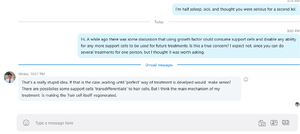humptydumpty69
Member
@JohnAdams, I think you are correct in what you are getting at. If a cure is not profitable enough, no one would produce it in the corporate world. Everyone has a vested interest, and there are those of us who are die hards for western science, and others with probably a tad of open-mindedness laced with a dash of naivety.
I found a quote for you, I dug through my copy of "Stem Cell Therapy, A Rising Tide" by Neil H Riordan PhD; it reads, "In May of 2016, the prominent British Medical Journal released a study that reported medical error to be the third leading cause of death in the United States. That means that you are more likely to die of medical error made by your doctor or medical practitioner than you are of all but two other conditions --heart disease or cancer."
Not that I think that this tells of the safety of SC and other alternative or FDA unapproved treatments, and I don't even necessarily agree with him making this statement in his book as to quell concern while simultaneously bolstering confidence in his own treatment, but I found this statistic very informative, and evidence that the Western option is no guarantee either, and that prudently we would be just as skeptical of it. I think you need look no further than ototoxic drugs, which is very likely to have been a factor in my own condition. I was young when I was taking them, and was advised by the pharmacist that "there are virtually no side effects." Turns out, I got "virtually" screwed.
I have not verified the citation of Dr. Riordan's statement, though I will list it for skeptics, as I could be foolish for taking his word:
"Makary MA and Daniel M. Medical error --the third leading cause of death in the US. BMJ. 2016;353:i2139. do: 10.1136/bmj.i2139."
I found a quote for you, I dug through my copy of "Stem Cell Therapy, A Rising Tide" by Neil H Riordan PhD; it reads, "In May of 2016, the prominent British Medical Journal released a study that reported medical error to be the third leading cause of death in the United States. That means that you are more likely to die of medical error made by your doctor or medical practitioner than you are of all but two other conditions --heart disease or cancer."
Not that I think that this tells of the safety of SC and other alternative or FDA unapproved treatments, and I don't even necessarily agree with him making this statement in his book as to quell concern while simultaneously bolstering confidence in his own treatment, but I found this statistic very informative, and evidence that the Western option is no guarantee either, and that prudently we would be just as skeptical of it. I think you need look no further than ototoxic drugs, which is very likely to have been a factor in my own condition. I was young when I was taking them, and was advised by the pharmacist that "there are virtually no side effects." Turns out, I got "virtually" screwed.
I have not verified the citation of Dr. Riordan's statement, though I will list it for skeptics, as I could be foolish for taking his word:
"Makary MA and Daniel M. Medical error --the third leading cause of death in the US. BMJ. 2016;353:i2139. do: 10.1136/bmj.i2139."

 Member
Member
